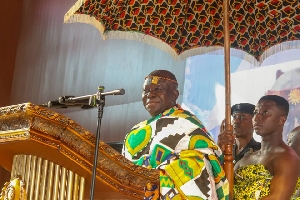- Home - News
- TWI News | TV
- Polls
- Year In Review
- News Archive
- Crime & Punishment
- Politics
- Regional
- Editorial
- Health
- Ghanaians Abroad
- Tabloid
- Africa
- Religion
- Election 2020
- Coronavirus
- News Videos | TV
- Photo Archives
- News Headlines
- Press Release
Opinions of Saturday, 18 April 2020
Columnist: Thelma N. A. Maclean-Apenteng
Helicopter money: A closer look
The COVID-19 novel Coronavirus has imposed heavy economic, financial, human and social costs on countries globally, and Ghana is no exception. With over a million confirmed cases worldwide, the World Health Organization has declared the virus a global pandemic. As such, most countries are taking drastic measures including lockdowns, social distancing, etc., in order to eradicate or reduce the pandemic. The lockdown measures imposed on citizens by some countries have caused severe economic repercussions for those countries.
These include, but are not limited to, significant reduction in household consumption which has dramatically decreased the production of goods and services, collapsed many micro and small-scale enterprises, and slashed revenue for both businesses and governments. The pandemic has also sent most stock exchanges into bears, significantly dipped prices of commodities including crude, reduced trade and among others. Thus, the tendency of a severe global recession is inevitable.
It is against this backdrop that most nations around the world are considering measures to combat the adverse economic repercussions of the pandemic. One popular measure, at centre stage of most discussions, is “Helicopter Money”. Helicopter money (or helicopter drop) is an unorthodox monetary policy in which central banks finances fiscal stimulus by increasing money supply. It can be done through the central banks creating new money either to purchase sovereign bonds and debts or send it directly to the public – cash handout - with no strings attached. The main objective of this unconventional policy, an alternative to quantitative easing, is to spur demand, growth and output thereby fighting long-lasting recession.
Before I proceed, let’s consider some of the perks of helicopter money:
I. Firstly, it puts money directly where it is most needed and where it would be easily spent from, “people’s pockets” (cash handout). Here, governments decide to pay each citizen or households that are financially affected a certain amount of money. This measure is effective because it is targeted towards increasing the income level of households, thus spurring consumption. It is, therefore, not surprising that in combating the adverse economic effect the pandemic, most policymakers are inclined to use this strategy. For example, in February 2020, Hong Kong announced a cash handout payment of about US$1,284 (HK$10,000) to each permanent resident aged 18 or older. The Eurozone also proposed a €1,000 per citizen, whilst the US agreed to send cheques directly to all Americans. Singapore also joined by proposing to provide small cash payments to all adult Singaporeans.
II. Secondly, helicopter drop has the tendency of providing strong stimulus without inflationary effects. Whilst this assertion has long been debated by orthodox economists, recent events have actually supported this. During the recent financial crisis in 2007, most central banks engaged in massive creation of money without inflationary effects. Thus, warnings about hyperinflation lost their bite. Worst case scenario, policymakers can reduce inflationary effects at full employment by increasing taxes and interest rates.
III. Additionally, helicopter money, when effectively implemented and targeted, may not increase public debt burden. Advocates of this unconventional approach argue that under certain circumstances, helicopter money that is directly targeted to affected parties, i.e. companies and households, will not add to government debt. This is because they can afford to pay off private debts, mortgage arrears, bills taxes, etc., which will positively affect the macroeconomy by increasing production, employment and revenue. Thus, governments may not need to borrow significantly to finance expenditures.
Accordingly, policymakers are all bending previously sacred rules and collectively agree that “Helicopter Drop” is the ultimate vaccine against a long-lasting COVID-19 recession. For instance, on 18 March 2020, Christine Lagarde, president of the European Central Bank, tweeted that “Extraordinary times require extraordinary action. There are no limits to our commitment to the euro. We are determined to use the full potential of our tools, within our mandate.” One of her plans is to overwhelm the debt markets with cash in order to keep the borrowing costs of countries like Italy from spinning out of control. Also, Robert Chote, the head of the UK Fiscal Discipline, said that “the government should not worry about short-term deficits because it was facing something like a “wartime situation”. “This is not a time to be squeamish about one-off additions to the public debt”.
So yes, drastic times call for drastic fiscal stimulus measures like purchase of government assets, low-interest rates, unemployment benefits, tax credits, cash handouts, funds to support businesses, etc., to counteract the adverse effects of the pandemic. The US, for example, has passed the largest stimulus package of about US$2 trillion, cc. 10% of its GDP. Australia, Germany and Canada have also responded with fiscal stimulus packages that account for about 9.7%, 4.5% and 3.6% of GDP, respectively.
COVID-19 Fiscal Stimulus Packages as a Share of GDP – Top 10 G20 Countries
Source: Statista, 27 March 2020
Additionally, the Eurozone has collectively deployed more than US$219 billion (€200 billion) to finance a raft of measures like cutting taxes and extending unemployment benefits. Also, the Eurozone has created a fund of about US$77 billion (€70 billion) to quickly funnel to countries and companies that urgently need it and a US$821 billion (€750 billion) bond-buying emergency programme allocated for borrowing by worse hit countries.
Ghana’s Case
In April 2019, the IMF and the World Bank stipulated that Ghana is expected to become the fastest-growing economy in 2019 and beyond. IMF predicted a growth rate of 8.8% in 2019 and 5.8% in 2020. The Finance Minister, Mr. Ken Ofori-Atta, in November 2019, was very bullish of Ghana’s economic fundamentals for 2020, thus, his prediction was a 6.8% growth in 2020. All these affirmed that Ghana was on a positive growth trajectory and will be among the fastest-growing economies in the world for 2020 and beyond.
Ghana started feeling the sting of the COVID-19 pandemic way before the first case was announced on the 12th March 2020. By nature, Ghana is highly dependent on trades from China and the export of primary commodities, and the lockdown of the Chinese economy, coupled with the oil price slump, significantly affected economic activities and revenue. Currently, we have over 600 cases and consequently, some parts of the country, i.e. Accra, Kasoa, Kumasi and Tema, are partially lockdown for 2 weeks.
The Finance Minister, in his assessment on the economic repercussions of the pandemic for 2020, emphasized that it will cost the country about US$1.79 billion (GH¢9.51 billion) about 2.5% of GDP. He also estimated that fiscal deficit will increase significantly by US$2.15 billion (GH¢11.4 billion) to US$5.70 billion (GH¢30.2 billion), about 7.8% of GDP and import duties will dip by US$152.45 million (GH¢808 million). In evaluating the effect of the pandemic on the real sector, Mr. Ofori Atta said GDP will slush to 2.5%, from the projected 6.8% and as a result the fortnight partial lockdown, the country’s GDP will reduced further to 1.5%. He further underlined that if the lockdown extends further then growth will significantly move southwards.
As mitigating measures to manage the effect the government has highlighted the following below:
I. Government has set up a Coronavirus Alleviation Programme fund of about US$188.68 million (GH¢1 billion), to be funded from the Ghana Stabilisation Fund.
II. The National Preparedness and Response Plan of about US$108.92 million (GH¢572 million)
III. A US$100 million (GH¢530 million) fund to assist Coronavirus Response Team
IV. Amendment of laws to reduce the Ghana Stabilisation Fund from the US$300 million (GH¢1.59 billion) cap to US$100 million (GH¢530 million), in order to deploy the excess funds to support stimulus measures
V. Other stimulus packages include - three months free water for all, a 100% absorption of electricity bill for low-income earners, as well as a 50% reduction in the cost of electricity for middle- and high-income earners, for three months.
Also, the government has applied for a US$12 billion (GH¢63.6 billion) facility from the World Bank and a US$10 billion (GH¢53 billion) facility from the IMF.
Aside this, other key stakeholders including donor agencies, private sector, etc. are all responding to assist the government’s effort to address the effect. Key among them includes:
I. The Ghana COVID-19 Private Sector Fund geared to support the government’s effort to address the pandemic
II. A short-long-term fund of US$100 million (GH¢530 million) fund from the World Bank to support initiatives
All these plans and measures represent a step in the right direction, but much needs to done in terms of:
I. Taking a closer look at the key components of helicopter drop including:
a. Cash handouts – Government to come clear with strategies to pay or transfer cash directly to citizens. This is because the informal sector (hawkers including ice water sellers, plantain chip sellers, kenkey sellers, etc.) accounts for about 70% of the economy and thus is directly affected by this COVID-19 pandemic. The social distancing coupled with the partial lockdown has drastically reduced the source of livelihoods for most of these players. Likewise, most employees, especially on contract, have been asked to stay home without any severance pay or income. All these have negatively impacted the demand for goods and services. Hence, it is critical that the government provides some stimulus package to households in order to boost consumption and output. A one-time cash to Ghanaians or some staggering stimulus packages affected players will be highly welcomed and a game changer to citizens.
b. Eyeing the micro, small and medium scale enterprises (MSMEs) for the stimulus packages – Ghanaians MSMEs, backbone of the economy, before the pandemic were struggling with cash-flow issues and effectively were living the equivalent of “paycheck to paycheck”. This was primarily as a result of the recent financial crisis in Ghana and lack of capital available to them. With the outbreak of the pandemic coupled with the partial lockdown, some of these MSMEs are on the verge of shutting down. Hence, it is vital that the government’s stimulus measures allot a percentage of the funds (disclosed amount) to this sector. Examples of packages should include, but not limited to, the following;
I. Disaster loans facility with “low interest” and moratoriums
ii. Loan facility available to mitigate supply disruptions
iii. Income support to avoid layoffs
iv. A fund to support MSMEs especially those in the food, beverages, health and agribusiness industries
v. Delay tax payment, tax credits and tax holidays, and among others.











